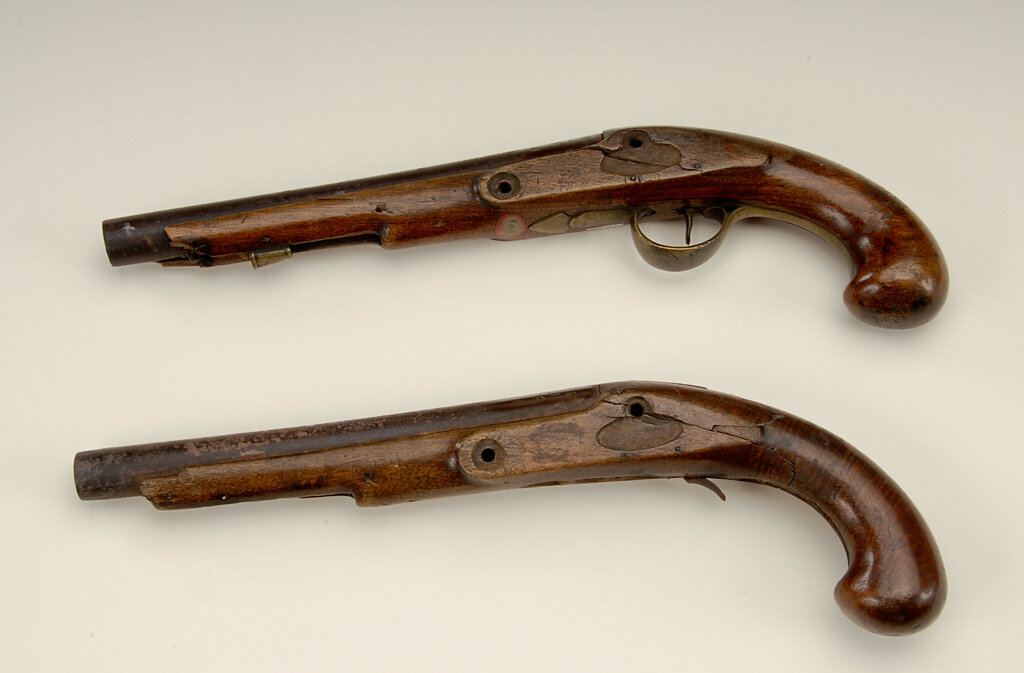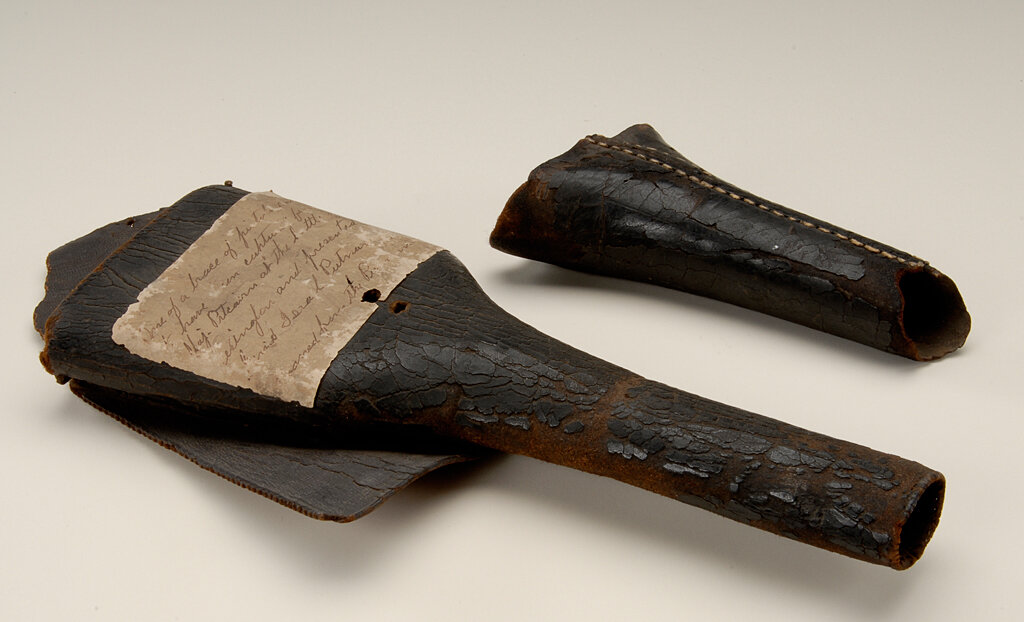By Dan Sousa*
Assistant Curator
On a fateful spring morning on Lexington’s town green in 1775, members of the local minute company confronted a contingent of British regular infantry on their way to Concord to destroy militia military supplies. The British soldiers opened fire when a shot was fired from an unknown source; eight militiamen died. Later that day, colonial militia and British forces opposed one another again, this time at Concord’s North Bridge. The colonists succeeded in pushing the British back from the bridge and the regulars began a long retreat back to Boston, under virtually constant fire the entire way. These clashes marked the beginning of an eight-year war with Great Britain. Today, Americans commemorate April 19, 1775 as the day the American Revolution began, and Patriots’ Day is a state holiday in Massachusetts and Maine.

Late in 1835, Epaphras Hoyt (1765-1850) of Deerfield, Massachusetts, penned an interesting critique of the famous actions at Lexington and Concord on April 19, 1775. Born and raised in the “old Indian House,” Epaphras displayed a keen interest in military history and affairs throughout his life. He attained the rank of major general of the Massachusetts militia, published two works on military science, and taught a course on the “Theoretical and Practical Art of War” at Deerfield Academy.
Though the militia succeeded in pushing the British army back to Boston, Hoyt considered the deadly encounter at Lexington to have been entirely avoidable. He criticized Lexington’s militia captain, John Parker, for having gathered his men on the green to face the British, thus exposing them to danger. Hoyt argued that Captain Parker should have had his men take up a position in the nearby woods or stone walls, and, from that standpoint, “retarded the march of the [British] army.” Hoyt argued that:
This mode of fighting would have given time for the militia of the neighboring towns to collect and join him [Capt. Parker], while he retarded the march of the army. No doubt they [the British] would have reached Concord, and probably destroyed the provincial stores; but a force would soon have assembled at that place sufficient to check their further progress, and by getting into their rear perhaps compeled [sic] them to surrender…[1]
From Hoyt’s perspective, such a strategy would have resulted in the British surrendering at Concord, thus ending the conflict for the day.
Interestingly enough, contemporaries of the battle expressed very similar critiques. General William Heath, a native of Roxbury, Massachusetts, who assisted in pushing the British back to Boston later that day, thought Parker’s decision to assemble in plain sight of the British army was ill advised. He commented “Bravery, when called to action, should always take the strong ground on the basis of reason.”[2] Similar thoughts, in fact, appear in more recent histories of the battle. George Daughan comments that while Captain Parker’s decision to muster the militia on the green led ultimately to the skirmish at Lexington, the fault did not rest with him entirely:
The massacre never would have happened had Parker not assembled his men in the first place. The problem wasn’t Parker’s, however. The patriot army simply wasn’t well enough organized to send him word not to confront the British column but to let it pass and only attack later, when the militia army had had time to mobilize and his men could become part of it. The confusion occurred because there was no higher officer to give Parker direction.[3]
In other words, rather than assign blame to a particular person, Daughan points to the larger issue of military command. Perhaps, if the American militia—particularly the militia leaders—were better organized, the skirmish at Lexington might never have occurred.
These critiques might give the impression that members of the militia were the instigators of the subsequent bloodshed on Lexington green that morning. This notion, however, could not be farther from the truth. Their intentions appear to have been cautionary and peaceful from the start. Captain Parker later explained that he “ordered our militia to meet on the common in said Lexington to consult what to do, and concluded not to be discovered, nor meddle or make with said regular troops (if they should approach) unless they should insult or molest us…”[4] This peaceful approach was much in line with the directive of the First Continental Congress issued the previous year, in 1774. The Congress’ judgment that citizens should exercise restraint and be “on the defensive,” was likely known by many militia captains throughout Massachusetts. [5] Moreover, on the morning of the skirmish itself, Captain Parker was clearly aware that he was far outnumbered by the British. Staging an attack against them, he knew, could only result in disaster.

The principle question, Epaphras Hoyt’s critique aside, remains: why did the Lexington minutemen decide to muster on the green that morning? The answer really gets to the heart of why we celebrate Patriot’s Day in the first place. The minutemen stood their ground that morning in part to show that they were willing to protect both their town and personal property, from an army—which they believed—could rob them of this liberty at any moment. They were not concerned with mounting an attack against British regulars, but rather upholding the principles of law and liberty that they had enjoyed in the decades prior to the Revolution. It is these principles which the Lexington militia fought to defend that April morning, which Americans will celebrate later this month on Patriots’ Day.
*The author would like to acknowledge Historic Deerfield Public Historian and Director of Academic Programs, Barbara Mathews, for her kind and generous editorial assistance.
[1] Extracts from Epaphras Hoyt Sketch-book Number 2, 1835-1836. Historic Deerfield Library (Deerfield, MA).
[2] Quoted in George C. Daughan, Lexington and Concord: The Battle Heard Round the World (New York: W.W. Norton & Company, 2018), 216.
[3] Ibid., 225.
[4] Quoted in Ibid., 216.
[5] Walter R. Borneman, American Spring: Lexington, Concord, and the Road to Revolution (New York: Little, Brown and Company, 2014), 157.